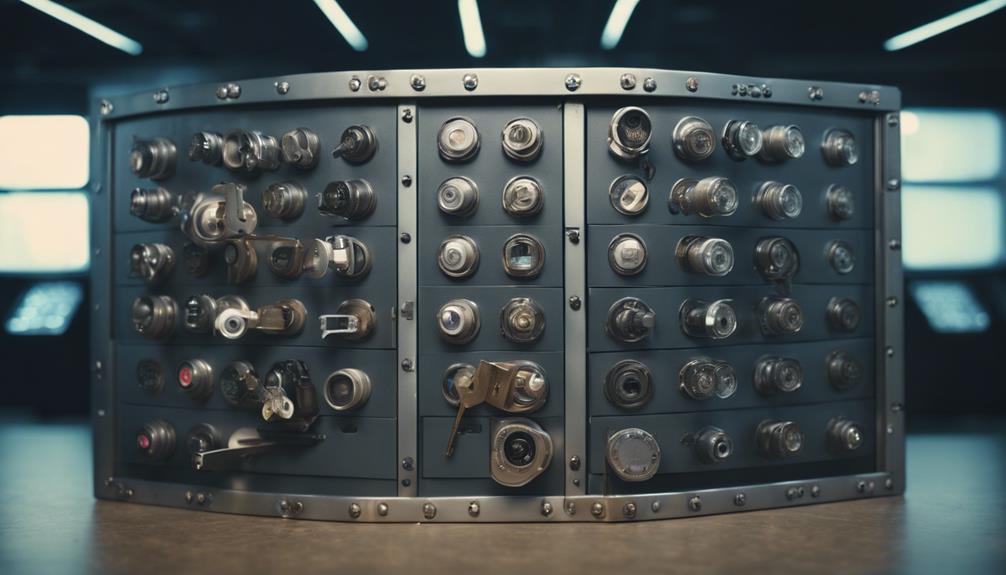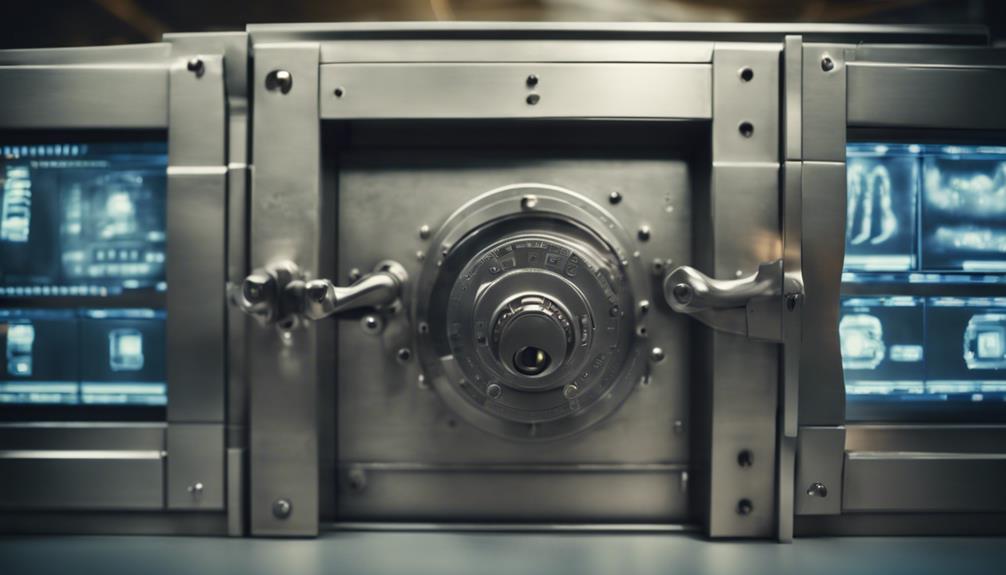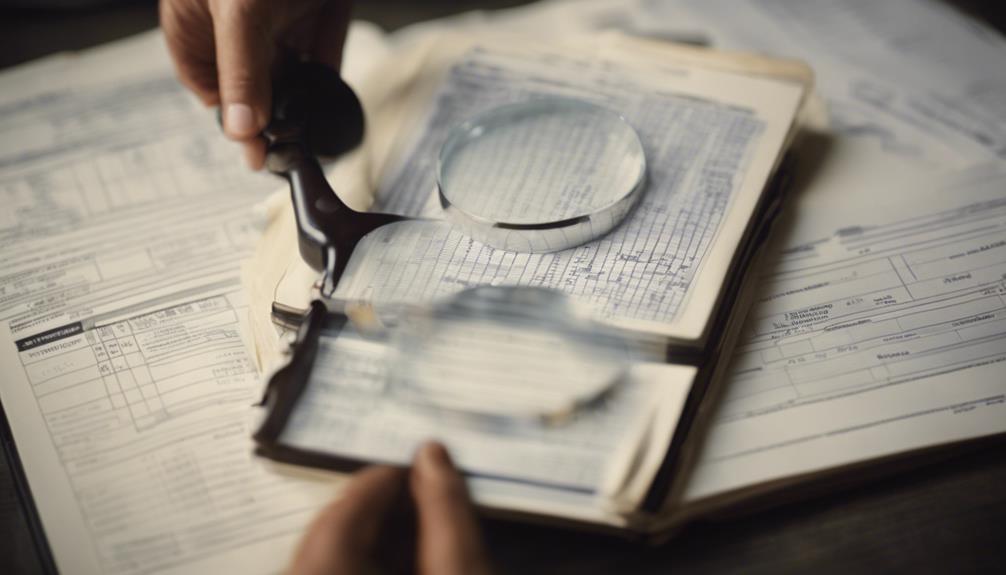When it comes to maintaining the integrity of your organization's financial processes, you must be meticulous in establishing robust internal controls. Segregation of duties, controlled access, and regular audits are just a few pieces of the puzzle.
But what about the lesser-known yet equally crucial components that can make or break your accounting system's security and accuracy? Stay tuned to discover the essential elements that can elevate your internal controls to the next level and ensure your financial operations are as foolproof as possible.
Key Takeaways
- Segregation of duties, authorization of invoices, limited physical access, and thorough documentation are crucial internal controls in accounting.
- Preventive controls reduce fraud risks, while detective controls identify errors post-occurrence.
- Corrective measures like physical audits, ledger verification, policy updates, and disciplinary actions enhance financial integrity.
- Internal controls in accounting align procedures with industry standards, safeguard financial integrity, and enhance operational efficiency.
Importance of Internal Controls
Internal controls play a pivotal role in ensuring regulatory compliance, enhancing operational efficiency, and safeguarding financial integrity within accounting processes. In the realm of accounting, these mechanisms are crucial for maintaining accurate financial reporting.
Preventive controls, such as segregation of duties and approval processes, help deter errors and fraud before they occur. On the other hand, detective controls, like reconciliations and audits, aid in identifying discrepancies post-incident. By implementing a combination of these internal controls, businesses can't only meet federal and state compliance requirements but also bolster their operational performance.
Financial reporting accuracy is greatly enhanced through the use of internal controls, which in turn reduces the likelihood of financial misstatements and enhances the overall credibility of the organization. Therefore, internal controls are indispensable tools for organizations looking to streamline their accounting processes, prevent fraud, and uphold the integrity of their financial information.
Types of Accounting Controls

Among the essential elements in accounting to ensure accuracy and integrity are the various types of controls implemented to safeguard financial processes and data. Preventive controls, such as segregation of duties, access controls, and double-entry accounting, play a crucial role in reducing errors and fraud by proactively preventing them. On the other hand, detective controls like inventory counts, internal audits, and reconciliations help in identifying issues post transactions, ensuring timely detection and resolution.
Standardization and approval authorizations are integral parts of accounting practices as they streamline processes, enhance consistency, and facilitate effective internal audits. Internal controls for financial accounting encompass a range of measures including policies, approvals, reconciliations, and physical audits to uphold accuracy and prevent fraudulent activities.
The management of internal controls involves regular updates, assessments, fostering integrity, and ensuring strict adherence to established policies and procedures. By incorporating both preventive and detective controls into accounting practices, organizations can strengthen their financial processes and maintain the integrity of their data.
Preventive Internal Controls
To enhance the accuracy and integrity of accounting processes, implementing preventive controls is crucial. Preventive controls are designed to deter errors and fraud proactively, safeguarding financial transactions from potential risks. Key measures include the separation of duties, authorization of invoices, limiting physical access, and maintaining thorough documentation. Here is a breakdown of these essential components in the context of preventive internal controls:
| Preventive Controls | Description | Importance |
|---|---|---|
| Separation of Duties | Ensuring that no single individual has complete control over a transaction | Reduces risks of fraud |
| Authorization of Invoices | Requiring approval before payments are made for goods or services | Prevents unauthorized spending |
| Limiting Physical Access | Restricting entry to financial records and assets to authorized personnel | Minimizes the risk of theft |
| Thorough Documentation | Keeping detailed records of all transactions and activities for transparency and audit trails | Ensures accountability |
Detective Internal Controls

Detective controls serve a critical function in identifying errors and irregularities post-occurrence to strengthen financial oversight and integrity. These controls act as a quality control mechanism, helping organizations reconcile accounts and ensuring the accuracy of accounting information. By conducting internal and external audits, detective controls uncover financial discrepancies that may have occurred despite preventive measures. Reconciliation of accounts is a key activity under detective controls, providing evidence of the effectiveness of existing preventive controls.
Detective controls play a crucial role in maintaining the quality and reliability of accounting information. They're instrumental in fraud prevention by detecting anomalies and discrepancies that could indicate fraudulent activities. By implementing robust detective controls, organizations can enhance their overall internal control environment and safeguard their financial processes. It's essential to view detective controls as complementary to preventive measures, working together to fortify the organization's financial integrity and accountability.
Corrective Measures in Accounting

When addressing accounting discrepancies, implementing corrective measures is essential to ensure the accuracy and integrity of financial records. Internal controls play a crucial role in identifying and rectifying errors within the accounting system. Conducting physical audits of assets and inventory is a fundamental corrective action to reconcile any discrepancies that may arise. Ledger verification serves as a key step in correcting errors, ensuring that financial data remains accurate and reliable. In cases of fraud or non-compliance, employee disciplinary action may be necessary to deter unethical behavior and reinforce adherence to established accounting policies. Moreover, regular policy updates are essential corrective actions to prevent future accounting discrepancies, as they help in aligning procedures with current industry standards and regulations.
| Internal Controls | Corrective Action |
|---|---|
| Physical audits | Reconcile discrepancies |
| Ledger verification | Ensure data accuracy |
| Policy updates | Prevent future errors |
Essential Accounting Control Practices

To ensure robust internal controls in accounting, focus on implementing segregation of duties to prevent potential fraud or errors in financial transactions.
Conducting regular reconciliations of accounts is crucial for maintaining accuracy and detecting any discrepancies promptly.
Additionally, establish strong access controls to restrict unauthorized entry into the accounting systems, enhancing overall security measures.
Segregation of Duties
Segregation of duties in accounting is a critical control practice that divides responsibilities among different individuals to enhance accountability and prevent errors and fraud. By ensuring that no single person has control over all aspects of a transaction, this internal control measure maintains financial integrity and reduces the risk of conflicts of interest. Implementing segregation of duties is fundamental in detecting and preventing unauthorized activities within the organization, ultimately enhancing the accuracy of financial reporting. Below is a table emphasizing the importance of this practice:
| Benefits of Segregation of Duties | Description |
|---|---|
| Enhanced accountability | Dividing responsibilities |
| Prevention of errors and fraud | Multiple individuals involved |
| Reduced risk of conflicts of interest | Accountability and accuracy boosted |
| Detection of unauthorized activities | Financial integrity maintained |
| Improved financial reporting accuracy | Fraud prevention |
Regular Audit Trails
Regular audit trails, being essential accounting control practices, play a crucial role in providing a detailed record of accounting transactions and activities for monitoring and review. These trails help in tracking changes and approvals within the accounting system, facilitating the identification of errors, discrepancies, and potential fraud.
By documenting every step of financial processes, audit trails enhance transparency and accountability within the organization. They're instrumental in ensuring compliance with regulations and internal policies, enabling efficient investigation and resolution of issues.
Implementing regular audit trails not only improves the reliability and integrity of financial information but also supports effective internal control practices. Utilizing audit trails is vital for maintaining accurate records and safeguarding the financial integrity of the organization.
Segregation of Duties

How does assigning different responsibilities to various employees enhance the integrity of accounting processes?
Segregation of duties plays a vital role in preventing fraud and errors within accounting processes. By dividing tasks among different individuals, no single person has complete control over a transaction from start to finish. This internal control establishes checks and balances, reducing the chances of internal fraud and inaccuracies. It's a fundamental preventive measure that boosts the accuracy and reliability of financial data.
Implementing segregation of duties is widely recognized as a best practice in internal controls as it helps safeguard assets and ensures accountability throughout the organization. This practice not only enhances the security of financial information but also promotes transparency and trust within the accounting processes.
Embracing segregation of duties is essential for maintaining the integrity and credibility of your organization's financial operations.
Restricted Financial System Access

To enhance the security and integrity of your organization's accounting processes, restricting financial system access is a critical measure. Internal controls such as access controls play a vital role in preventing unauthorized transactions, errors, and fraudulent activities within your accounting system. By implementing role-based access, you can ensure that employees only have access to the information necessary for their specific job functions, reducing the risk of data breaches or misuse.
User authentication methods like passwords, biometrics, or two-factor authentication add an extra layer of security and control over your financial systems, safeguarding sensitive data from unauthorized access. Regularly reviewing and updating access permissions based on employees' roles and responsibilities is essential for maintaining effective internal controls. This practice ensures that employees have the right level of access needed to perform their duties while minimizing the possibility of internal threats or errors that could compromise your organization's financial data.
Reconciling Accounts and Transactions

When reconciling accounts and transactions, you must ensure that the account verification process is thorough and accurate. Utilizing transaction matching techniques is essential to align financial records and identify any discrepancies promptly.
This practice enhances the reliability and integrity of financial data, serving as a crucial detective control mechanism.
Account Verification Process
What essential role does the account verification process play in maintaining financial transparency and compliance?
The account verification process, a crucial detective control, ensures the accuracy of financial records by reconciling accounts and transactions. By comparing various financial records, discrepancies can be identified, helping to detect errors, fraud, or inconsistencies in the data.
Regular reconciliation not only enhances the reliability and integrity of financial information but also aids in upholding financial transparency and compliance with regulations. Effective account verification processes are indispensable for organizations to provide accurate financial reports, prevent misstatements, and demonstrate accountability.
Embracing robust verification practices is key to fostering trust among stakeholders and ensuring the credibility of financial data.
Transaction Matching Techniques
Transaction matching techniques play a vital role in financial control and accuracy by reconciling accounts and transactions to identify discrepancies and ensure the integrity of financial data. This process involves comparing transaction records with bank statements or other sources to verify the completeness and accuracy of financial information.
By reconciling accounts, potential errors, fraud, or missing transactions that could impact financial reporting are detected. It's an essential internal control method to uphold the integrity of financial information and prevent misstatements in financial statements.
Proper transaction matching techniques enhance transparency, reduce risks, and support compliance with regulatory requirements in accounting processes, ultimately contributing to the overall reliability and trustworthiness of financial data.
Double-Entry Accounting Benefits

Utilizing the double-entry accounting method in financial practices ensures enhanced accuracy and reliability in recording transactions by meticulously documenting each entry in both debit and credit columns. Here are the benefits of employing double-entry accounting:
- Accuracy: By recording each transaction twice, errors are minimized, and the likelihood of inaccuracies in financial records is reduced.
- Checks and Balances: This system provides a built-in mechanism for cross-verification, helping to detect and prevent fraud or mistakes.
- Financial Reporting: Double-entry accounting facilitates the preparation of reliable financial statements, aiding in decision-making processes.
- Accountability: Through the accountability created by this method, discrepancies can be swiftly identified and rectified, promoting transparency in financial operations.
Incorporating the double-entry accounting system not only ensures the integrity of financial data but also fosters trust and confidence in the information presented, making it a vital component in sound financial management practices.
Frequently Asked Questions
What Are the 5 Internal Controls in Accounting?
To maintain effective internal controls in accounting, it's crucial to focus on:
- Fraud prevention
- Risk assessment
- Segregation of duties
- Monitoring activities
- Control environment
- Information technology
- Compliance measures
- Internal audit
- Process improvements
- Internal reporting
Ensuring these elements are in place will help safeguard your financial operations, improve accuracy, and enhance accountability within your organization. Strive for a comprehensive approach to internal controls to safeguard your accounting processes.
What Are the Six Internal Controls of Accounting?
To effectively safeguard your organization's financial integrity, you should focus on six key internal controls for accounting. These controls encompass:
- Fraud prevention
- Risk assessment
- Compliance monitoring
- Process improvement
- Technology integration
What Are the Four Internal Control Measures in Accounting?
To effectively manage accounting processes, it's crucial to implement key internal control measures. These include:
- Fraud prevention
- Risk assessment
- Compliance monitoring
- Segregation of duties
- Documentation procedures
By incorporating these practices, you can safeguard financial transactions, detect errors, prevent unauthorized payments, limit access to assets, and maintain accurate records.
Implementing these internal controls will help ensure the integrity and reliability of your accounting processes.
Which Is the Best Example of Internal Controls to Ensure Accurate Financial Records?
When striving for impeccable financial accuracy, a top-notch internal control is conducting thorough documentation reviews. This ensures every number is accounted for and in its rightful place.
By meticulously scrutinizing records, you can catch any discrepancies before they snowball into bigger issues.
Make it a habit to review with eagle eyes, and your financial records will thank you for the clarity and precision you bring to the table.
Conclusion
As you navigate the complex world of accounting controls, remember that they serve as the shield protecting your organization's financial health.
Just as a lighthouse guides ships safely to shore, internal controls guide your business towards stability and success.
By implementing the best practices in preventive, detective, and corrective measures, you're ensuring a clear path forward, free from the turbulent waters of financial risk.
Stay vigilant, stay secure, and steer your organization towards prosperity.